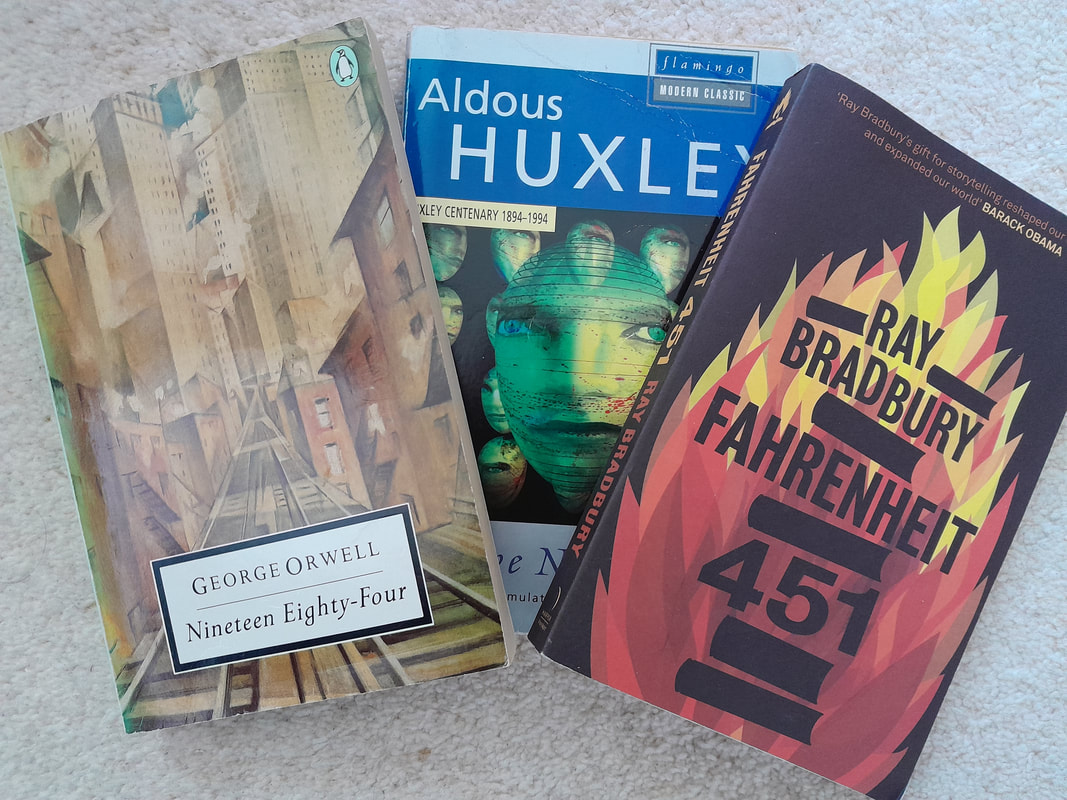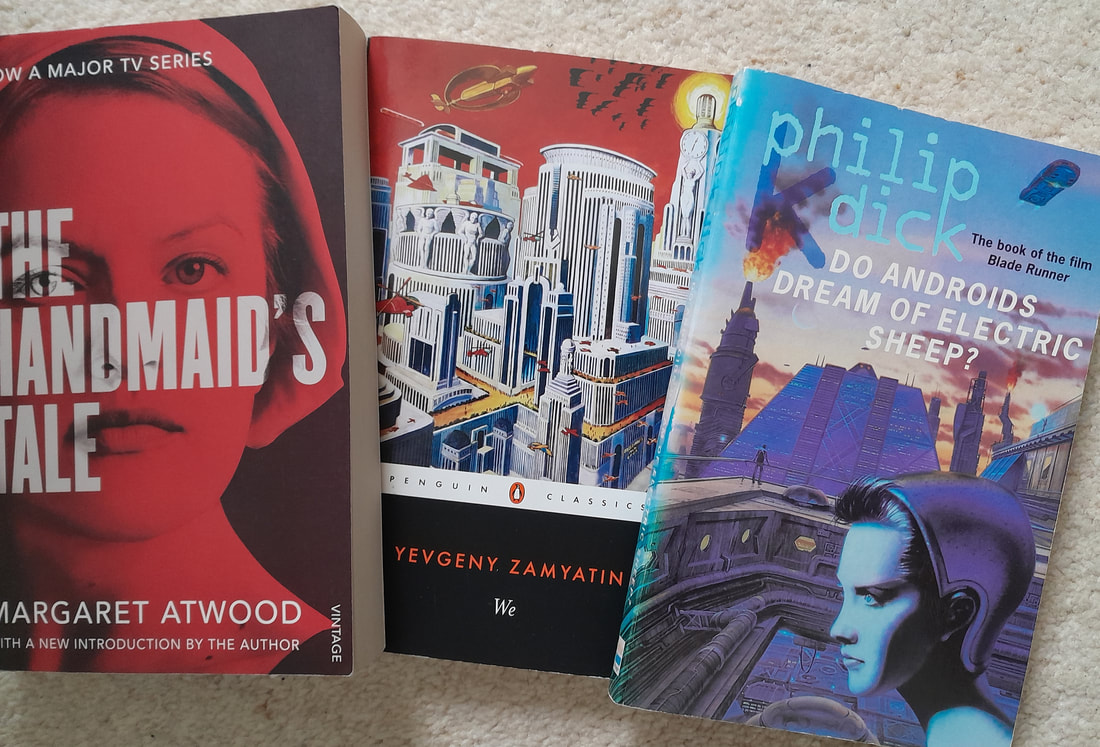|
Dystopian science fiction is a genre I've long enjoyed and when I came to write The Waste, there were several novels that influenced and inspired me. Brave New World by Aldous Huxley Brave New World is often cited as one of the most influential and prophetical books of the twentieth century. Set in the far future, the World Controllers of the story have strived to create a perfect world. Every individual receives pre-natal / post-natal conditioning so as to accept his or her position in society, from the Alpha-Plus ruling class to the Epsilon-Minus Semi-Morons who are bred to perform menial tasks. This society is perfectly ordered, and this control is strengthened through the state-endorsed use of the drug soma, and other pleasurable distractions. In many senses, the people of the novel are controlled by their pleasure and distractions; when life is so good and so easy, why even think to challenge the status quo, what would be the purpose? This is not a tyranny of brutal physical oppression, enforced by military strength and prison camps, but a tyranny in which the citizens are imprisoned in a gilded-cage of amusement and ease. I found this a fascinating concept: that a dystopian could be so insidious, almost hiding in plain sight with a benevolent façade. Some of the thematic elements of Brave New World certainly influenced parts of The Waste. In the society shaped by the alien Seraphim, people are encouraged to focus only on their own needs and pleasures, with any concerns for wider society deemed odd, even suspicious – like the genetically bred humans of Brave New World, do they even notice they are living in a dystopian world, or if they did, would they care? The titular Waste of my novel, a vast open-air prison, was also in part influenced by the Savage Reservation visited by Bernard Marx and Lenina Crowne in Brave New World. Brave New World still impresses with its brilliant invention and wit, and as time passes, I’d argue Huxley’s novel simply becomes more and more relevant, and perhaps more and more troubling. Nineteen Eighty-Four by George Orwell To the best of my memory, Nineteen Eighty-Four was the first dystopian novel I read and it is a book that certainly leaves a deep impression and although I have re-read it several times, its impact is never lessened. Airstrip-One feels like a nightmare, a crucible of relentless pressure: the constant surveillance, the crushing conformity, the lingering danger of arrest and the sheer misery of the horrible food, the bitter cold and the dilapidated living conditions. And in this wretched world, mutilated by an endless three-sided war, anger and sexual frustration are channeled into hatred towards enemies of the state real and imaginary. The most memorable display of this is the Two Minute Hate, where the Party Members are whipped into a frenzy of loathing. Outside of the Party members, the rest of the population of Airstrip-One, known as the proles, are distracted from political involvement by mass entertainment, a dubious National Lottery and sport (and, where necessary, the iron fist of state security). And it is difficult to read Winston Smith’s diary entry about his visit to the cinema, as he describes a film in which ships full of refugees are bombed in the Mediterranean, and not consider our own society’s indifference, even hostility, as children and adult alike drown in the very same sea Orwell described. In The Waste, this influenced the character of Oswald Beckett who shows no sympathy to the desperate refugees for whom he is responsible, seeing them not as people but as data to be controlled as part of reaching budgetary targets and developing his blossoming career. Nineteen Eighty-Four is undoubtedly a book with profound comments on politics and society, it remains a story with a very human focus. We see Winston Smith’s suffering in everyday terms: the constant bombardment of propaganda, his blunt razors, the crumbling cigarettes, his coughing fits and varicose ulcers. The readers sees the misery and loneliness of an individual crushed and dehumanized by the tools of political terror. This approach influenced me when I wrote The Waste, and rather than take a broad view, I wanted to explore the society created by the alien Seraphim mainly through the lens of one ordinary person. Nineteen Eighty-Four has had a huge influence on me as a reader and a writer. Orwell’s novel continues to burn with fury is a warning to us all, a warning I believe will endure through the ages. Fahrenheit 451 by Ray Bradbury In the future society of Fahrenheit 451 all books are illegal and if any are discovered, they are burned, for books are considered disruptive, dangerous, a cause of unhappiness. Guy Montag is a ‘fireman’, whose job is to find books and destroy them. Within this world, books are no longer valued and instead people have moved to new and addictive forms of media, encapsulated by the ‘parlour walls’, screens that fill entire walls and interact with the viewers. This media is seen as a better fit for an increasingly rapid pace of life and shortened attention spans. Initially settled in his job and home life, Montag’s unease with this society grows as he feels increasingly uncomfortable with the mind-numbing ‘entertainment’, which addicts so many people, and he begins to doubt the wisdom of book burning, especially when he sees the lengths some custodians are willing to go to protect their books. Soon, Montag begins hiding books himself and the experience of reading starts to change him… These ideas certainly influenced parts of The Waste. For example, although in my novel, books are not banned as such, they are considered quaint, redundant even – they have simply been supplanted by easier, less demanding media. The alien Seraphim encourage humans to only consider the present, to ignore or forget the pain of the past; books, as stores of knowledge, ideas and experiences, play no part in this world view. Museums and art galleries likewise are considered irrelevant and so close down out of apathy rather than a direct decree – of course, the Seraphim are not above appropriating works of human art when so inclined and hoard their treasures out of public view. Other books: Although these three books influenced my writing of The Waste, there are several other dystopian novels that were significant touchstones too, such as The Handmaid’s Tale by Margaret Atwood, We by Yevgeny Zamyatin and Do Androids Dream of Electric Sheep? by Philip K. Dick, and I would definitely recommend these all as powerful, thought-provoking reads.
The Waste is out now, available in eBook and paperback, and free to read through Kindle Unlimited.
5 Comments
Your ability to articulate the specific impact each novel has had on your writing, whether through themes, style, or narrative techniques, is insightful. It's clear that you've approached your craft with a voracious and discerning reader's eye, drawing inspiration from a diverse range of sources.
Reply
22/11/2023 05:31:10 am
Children receive free education in any country in Europe and can work in any country they want. The whole family will be presented with a wealth of options that come with freedom of movement. Earning a euro income means achieving a stable and secure future https://turkishresidencepermit.com
Reply
9/2/2024 09:12:15 pm
This article was super helpful! I've been looking for tips like these, and your writing style made it a breeze to read. Can't wait to implement these ideas.
Reply
9/2/2024 11:00:15 pm
Great Stuff! you could be my goto guy. Nobody can write it better than you!
Reply
Paul
26/3/2024 06:58:21 pm
Hey Steven,
Reply
Leave a Reply. |
Archives
October 2023
Categories
All
|


 RSS Feed
RSS Feed